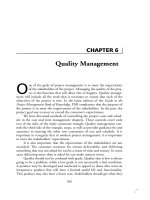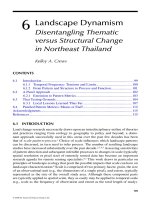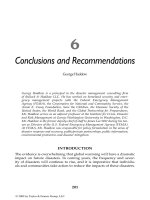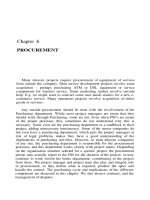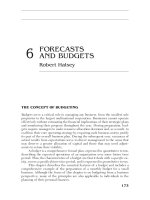bg management accounting chapter 6 384
Bạn đang xem bản rút gọn của tài liệu. Xem và tải ngay bản đầy đủ của tài liệu tại đây (1.03 MB, 15 trang )
CHAPTER 6
VARIABLE COSTING AND
SEGMENT REPORTING
6.1. Overview of Absorption and Variable Costing
Variable costing (also called direct/marginal costing) is a
method that charges products with only the variable
manufacturing costs. The cost of a unit of product consists of
the three variable manufacturing costs — direct material,
direct labor, and variable manufacturing overhead.
6.1. Overview of Absorption and Variable
Costing
Absorption costing (also called full costing) is a method that
charges products with all manufacturing costs, regardless of
whether the costs are fixed or variable. The cost of a unit of
product consists of all four types of manufacturing costs —
direct material, direct labor, variable manufacturing overhead,
and fixed manufacturing overhead.
6.1. Overview of Absorption and Variable Costing
Direct Materials
Product
Costs
Direct Labor
Variable Manufacturing Overhead
Product
Costs
Fixed Manufacturing Overhead
Period
Costs
Variable Selling and Administrative Expenses
Fixed Selling and Administrative Expenses
Period
Costs
6.2. Income Comparison of
Absorption and Variable Costing
Let’s assume the following additional information for Harvey
Company.
– 20,000 units were sold during the year at a price of $30
each.
– There were no units in beginning inventory.
Now, let’s compute net operating income using both
absorption and variable costing.
Unit Cost Computations
Harvey Company produces a single product
with the following information available:
6.2. Income Comparison of
Absorption and Variable Costing
Income Statement of Absorption Costing
6.2. Income Comparison of
Absorption and Variable Costing
Income Statement of Variable Costing
6.2. Income Comparison of
Absorption and Variable Costing
The diffirence from Income of 2 methods
6.2. Income Comparison of
Absorption and Variable Costing
Opponents of absorption costing argue that shifting
fixed manufacturing overhead costs between periods
can lead to misinterpretations and faulty decisions.
Those who favor variable costing argue that the income
statements are easier to understand because net operating
income is only affected by changes in unit sales. The
resulting income amounts are more consistent with
managers’ expectations.
6.3. Segment income statement
A segment is any part or activity of an organization about
which a manager seeks cost, revenue, or profit data.
A segment can be . . .
6.3.1. Segment income statement
Traceable and Common Fixed Costs and the Segment Margin
A traceable fixed cost of a segment is a fixed cost that is incurred
because of the existence of the segment— if the segment had never
existed, the fixed cost would not have been incurred; and if the
segment were eliminated, the fixed cost would disappear.
6.3.1. Segment income statement
Traceable and Common Fixed Costs and the Segment Margin
A common fixed cost is a fixed cost that supports the operations
of more than one segment, but is not traceable in whole or in part to
any one segment. Even if a segment were entirely eliminated, there
would be no change in a true common fixed cost
6.3.1. Segment income statement
The segment margin is obtained by deducting the
traceable fixed costs of a segment from the
segment’s contribution margin. It represents the
margin available after a segment has covered all of
its own costs
6.3.2. Segment break - even point and
decision making
There are two keys to building segmented
income statements:
A contribution format should be used
because it separates fixed from
variable costs and it enables the
calculation of a contribution margin.
Traceable fixed costs should be
separated from common fixed costs to
enable the calculation of a segment
margin.

